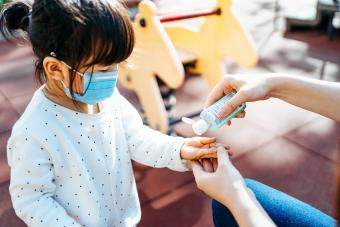
Self-isolating, although tricky, can help you keep individuals in your household healthy during an epidemic or pandemic. Understanding how to manage self-isolation when one or more members of your household is under the weather can help you prevent further spread of the given illness to other members of your family and the public.
How Much Contact Is Appropriate
Minimizing contact between your family and whoever is sick in your home may help prevent the spread of an illness. Illnesses will spread in different ways and can last for various amounts of time on surfaces. With coronavirus, for example, researchers are still learning about how long the virus can last on certain surfaces, as well as how the illness is transmitted to others. Knowing what type of illness you are dealing with can help you identify the best ways to keep your home clean, as well as how much contact is appropriate between family members. In general:
- Minimize contact with individuals who are under the weather unless they need assistance caring for themselves.
- Try to keep children and more vulnerable individuals away from those who are ill in the household.
- If contact must occur, be sure to wash your hands for at least 30 seconds after leaving their space.
- Avoid touching your face when caring for the ill individual.
- If caring for a little one, minimal contact may be unavoidable, so be sure to wash your hands frequently and work on helping them get healthy as soon as possible.
- Do not share drinks or food utensils if possible. The individual who is under the weather should eat in a different area if possible as well.
In general, if no one is exhibiting symptoms of an illness, regular family contact is perfectly okay during an epidemic or pandemic with those in your household. If anyone heads out to run essential errands, be sure they wash their hands thoroughly before interacting with other members in the family.

How to Reduce Contact
If you have small children in the home, minimizing contact might feel overwhelming. Speak with your kids about washing their hands often and not sharing anything used to eat or drink. With children, the best thing you can do is be kind to yourself, do what you can to keep the home clean, and keep the contact with the sick individual reduced by setting up their own space. If you are the only caretaker in the home and you are under the weather, you may want to consider wearing a face mask when in close quarters with your children or other vulnerable individuals. Take care of yourself and try to get better as soon as possible.
How to Keep Kids Safe
With kids, it's important to have realistic expectations about what can and cannot be done. Do your best to ensure the everyone is washing their hands and is taking good care of themselves.
Create a Separate Space
If one child is under the weather, try to set up a private area for them so they can rest and eat. Giving them their own space can help minimize the spread to other children.
Clean Frequently
Use a child-safe disinfectant to clean frequently touched areas on a daily basis if possible and launder their clothing, bedding, and towels on the hottest setting. If possible, have them use a bathroom separate from any other individuals in the household. If there is one shared restroom, disinfect the bathroom at least once a day and more frequently if possible to prevent illness spread. Wash your hands after spending time with them.

Keeping Your House Clean
Keeping your home clean and disinfected can help minimize the spread of germs. To do so:
- Vacuum at least once a week and spend extra time on rugs and carpets.
- Use a disinfectant to clean your bathroom(s), kitchen, commonly touched areas (knobs, remotes, tables, counters, light switches), and the room of whoever is under the weather at least a few times a week and ideally every day until the illness has passed.
- Wash the ill individual's clothing and towels separately on the hottest setting and be sure to wash your hands after touching anyone's dirty laundry in case there are germs on the clothing.
- Any dishes, cups, or utensils that an ill individual uses should be washed immediately. Whoever washes the dishes should wash their hands thoroughly afterwards.

Steps to Take at Home to Minimize Illness Spread
Illness can spread quickly within the same household due to closer quarters. To minimize illness spread:
- Keep your home clean and sanitized.
- Speak with everyone about washing their hands frequently throughout the day.
- If possible, minimize contact with anyone who doesn't feel well. If you are caring for anyone who is under the weather, wash your hands frequently.
- Wash laundry on the hottest setting and wash your hands after handling any dirty laundry.
- If you are under the weather, you can wear a face mask when spending time with others in the household.
- Use a separate trash can designated for the sick individual to throw away any miscellaneous items. Empty this trash every day and spray it down with a wipe-able disinfectant.
- If possible designate a space for the sick individual to rest away from others in the home.
- Speak with everyone about trying not to touch their face.
- Follow guidelines about how long to isolate after recovering from an illness. For some illnesses, isolation may last for weeks after the individual began displaying symptoms or after the symptoms have subsided.

Reducing Familial Stress
An increased stress level can compromise your immune system. When you speak with children about staying healthy, do so in age-appropriate ways without scaring them or causing additional stress. Find healthy ways to decrease your stress level whether you are under the weather or are caring for others in the home. Some stress reducing options include:
- Deep breathing
- Practicing yoga
- Stretching
- Listening to calming music
- Journaling
- Spending time outside if possible
- Spending time with animals or watching funny or lighthearted animal videos
- Speaking to a trusted loved one, friend, or counselor

Keeping Your Family As Healthy As Possible
If your family is self-isolating, it's important to keep everyone's stress levels down, maintain a clean and sanitized household, and to take extra precautions if one or more individuals are under the weather. Knowing how to self isolate with a family can help reduce illness spread to other family members and to the public.







